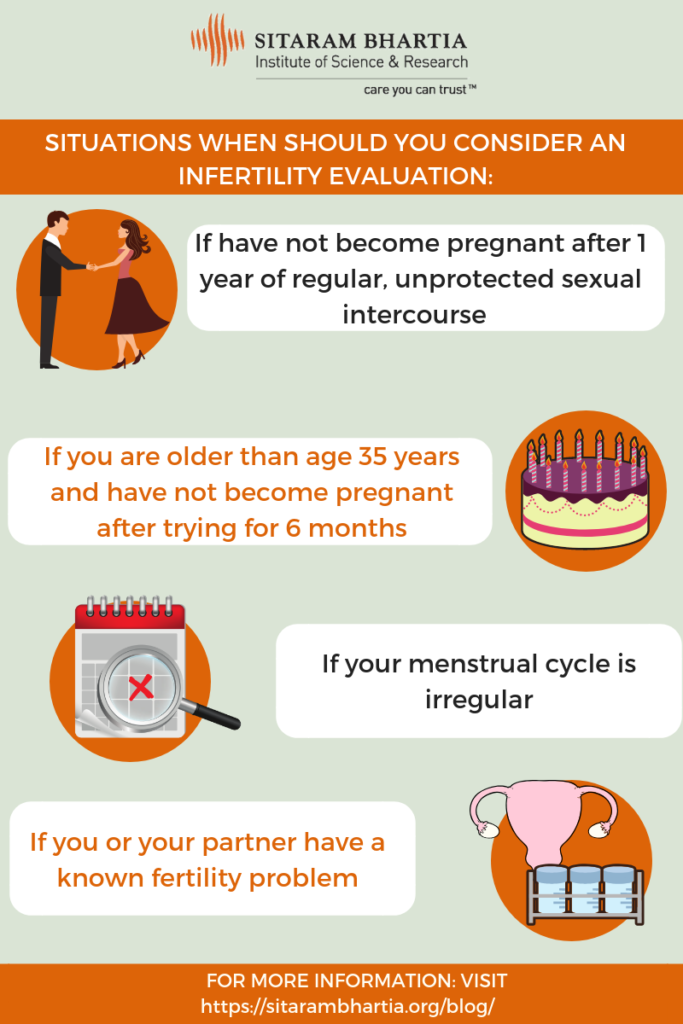According to Indian Society of Assisted Reproduction, infertility is seen to affect about 10 -14% of the Indian population.
Radha Jain, 27, and her husband Raghavan Jain, 29 were trying to conceive for some time now and wondered what could be the possible reason for not getting pregnant when everything is normal.
After months of negative pregnancy results, the couple was slowly losing hope. Trying for 8 months now, it was becoming difficult for them to visit their friends who had children.
On recommendation from close friends, the couple decided to approach Dr Priti Arora Dhamija, Infertility Specialist at Sitaram Bhartia Hospital in South Delhi.
Dr Priti listened to their predicament and took a detailed medical history. She also asked them about their lifestyle, working hours and whether they were able to spend enough time with each other.
After answering the questions, Radha hesitantly asked the doctor, “Why am I not getting pregnant? Is it normal not to conceive straight away?”
The doctor calmed her down and answered, “Even a healthy couple takes up to one year to conceive, so don’t let unsuccessful attempts discourage you.”
“Conception depends on many factors like age, general well-being, reproductive health and how long you’ve been trying to conceive.”
According to the American College of Obstetricians and Gynecologists (ACOG), here are a few situations when you should consider an infertility evaluation:

Radha’s menstrual cycle was regular, both the partners were young, keen and trying regularly for the past 8 months to conceive with no coital dysfunction. They felt much calmer upon learning that there wasn’t any cause of concern.
Radha was still curious about possible reasons for not getting pregnant when everything is normal and asked the doctor about the same.
Dr Priti explained, “An unhealthy lifestyle, weight issues, high stress and confusion about the fertile period could be possible reasons for not getting pregnant.”
What are apparent reasons for not getting pregnant when everything is normal?
Here are 5 possible reasons for not getting pregnant when everything is normal:
1. An unhealthy lifestyle may be the reason behind not getting pregnant
When trying to conceive, adopting a healthy lifestyle is a vital step for both partners.
The doctor highlights, “If you have a disturbed sleep pattern, unhealthy food habits or no way to manage stress, it may affect your chances of conceiving.”
“You should view this as an opportunity to de-stress and make positive lifestyle changes.”
Learn about the changes you need to make here: PCOD: What You Need to Know
Radha was always aware that she and her husband weren’t leading the most healthy lifestyle but knowing that it could affect their chances of conception was a real wake-up call for her.
Read: How to Get Pregnant in Hindi – गर्भधारण करने के लिए 5 टिप्स
2. Weight issues can be a reason for not getting pregnant when everything is normal
If you are underweight or overweight, it may become an obstacle when trying to conceive.
She continues, “It is ideal for women to fall within the apt BMI range and to maintain the right waist to hip ratio. Men should also maintain a healthy weight as it affects their semen quality too.”
Try to exercise for 30 minutes at least 3-4 times in a week to maintain a healthy weight.
3. Stress is one of the most common lifestyle reason for not getting pregnant
Stress levels, anxiety and depression affect your fertility and menstrual cycle. In men too, stress is known as a major factor that contributes to a low sperm count or poor sperm motility.
Dr Priti advises, “De-stress as high stress could negatively impact your sexual desire and fertility levels. Try activities like couple spa and massages, deep breathing exercises, meditation and yoga.”
Upon hearing this, Radha’s resolution to sign them up for couple yoga got even stronger. She was determined to book their sessions as soon as they walked out of the hospital.
4. Missing the fertile period could be a reason for not getting pregnant when everything is normal
The chances of getting pregnant are the highest during ovulation.
Dr Priti further explains to the couple, “Ovulation is the time when your mature egg is released to the fallopian tubes for possible fertilization. Make sure you calculate your ovulation period correctly and try accordingly as this is a critical step when trying to conceive.”
Ask your doctor to help calculate your ovulation period based on your average menstrual cycle or get an ovulation test kit.
You could also learn how to calculate ovulation here: How to Get Pregnant: How to Have a Baby in 5 Quick Steps
5. Lubricants may become an obstacle when trying
Lubricants may adversely affect the motility and quality of male sperm and therefore pose an obstacle to the fertilization process. It is advised to lay off the lubricants or try the fertility-friendly ones.
The couple was advised to keep trying for another 6 months keeping their young age and absence of any obvious symptoms or concerns in mind.
Unfortunately, they were still unable to conceive and decided to follow-up with Dr Priti. During their consultation, she weighed in the possible causes and explained that they can only determine the causes by undergoing a basic fertility evaluation.
What are the most common reason not getting pregnant after trying for a while?
During the consultation, Dr Priti discussed the most common reasons for not getting pregnant after trying for a while.
1. Failure to produce or release a mature egg:
Dr Priti explains, “Woman may have impaired ovulation due to disturbed hormonal environment or poor ovarian reserve. This may or may not lead to subtle menstrual irregularities. There may be interference with the normal development of the egg or its rupture.”
“To understand the process of egg formation in your body, your doctor may suggest ultrasound for follicular monitoring, which happens on different days of your menstrual cycle.”
2. Semen quality of the male partner:
Many times, the male partner may be responsible for the couple being unable to conceive.
Also Read: 5 Myths and Truths About Infertility You Need to Know
The infertility specialist emphasized, “There may be subtle abnormalities in the semen like low sperm count and/or motility which may result in failure in conception.”
“A semen analysis can be suggested in certain cases wherein, abstinence of 3-5 days is advised.”
3. The health of fallopian tubes:
The doctor continues, “In women who have undergone pelvic surgery or appendicectomy there may be silent blockage of tubes. Cases like To be able to conceive, the tubes should be open and functional.”
Tests like hysterosalpingogram (HSG), which is an OPD procedure may be advised to evaluate tubal and uterine health.
4. Uterine structural abnormalities:
Sometimes there may be some defects inside the uterine cavity of the woman which may interfere with the embryo’s ability to implant and grow.
Dr Priti explains, “Abnormalities in the uterine cavity like scar tissue, presence of micro polyps or even the shape of the cavity can affect conception. At times, there may be irregularities in formation and shedding of internal lining during the menstrual cycle which may become a detriment to smooth conception.”
A pelvic ultrasound may be required to detect conditions and a minor day care procedure called hysteroscopy may be required to treat some of these uterine structural problems.
5. Unknown medical conditions like Endometriosis
Sometimes there may be unknown medical conditions Endometriosis, which may present later in life or be perceived as “normal”.
Dr Priti emphasises, “In these cases, women may face severe pain before or during their menstrual cycles which can worsen overtime. This can be a sign of underlying endometriosis and needs appropriate management.”
After a proper discussion, the couple got their basic fertility tests done as advised by Dr Priti.
Once the test results were revealed to be normal, Radha and Raghavan were advised few more advanced tests. The advanced fertility evaluation disclosed no cause of concerns and it was suspected to be a case of unexplained infertility.
Radha asked the doctor about unexplained infertility and whether they should be concerned.
“Sometimes, couples may have unknown fertility problems and few times, there could be no concrete reason behind it as well.”
What is unexplained infertility?
Dr Priti answered, “When there are no obvious causes for a couple being unable to conceive, it is known as unexplained infertility. The fertility evaluation tests of the couple also turn out to be normal in such a scenario.”
The couple still remained hopeful.
The doctor suggested a conservative procedure called IUI, which improves the number or quality of available eggs with prescribed drugs and uses purified semen that could help solve a few problems.
Raghavan and Radha thought that it was a worth a try before considering other fertility treatments.
The couple was able to conceive after their third IUI cycle and they were both overjoyed.
Radha is currently 6 months pregnant and consulting Dr Priti for her maternity needs as well.
While waiting for her appointment, Radha shares, “I won’t lie – it wasn’t easy but the fact that my husband was with me and we were both in this together made us stronger than ever! We didn’t lose hope thanks to the team of doctors who were so supportive and accommodating.”
Towards the end, Raghavan said, “We just had to be more patient and persevere despite the many obstacles.”
Learn more about Fertility Services at Sitaram Bhartia
This article has been written with inputs from Dr. Priti Arora Dhamija, who has over 16 years of experience as a fertility specialist and obstetrician-gynecologist. She has received training from the Indian Fertility Society in Assisted Reproductive Technologies and fertility enhancing laparoscopy.

Medically Reviewed by Dr. Priti Arora Dhamija
Senior Gynecologist & Fertility Expert
MBBS, Maulana Azad Medical College, Delhi (1999); M.D, Lady Hardinge Medical College (2004); DNB Obstetrics & Gynecology (2004); Diploma in Pelvic Endoscopy, Kiel, Germany (2014)
Interested in consulting Dr. Priti for your preconception journey? Fill in the form below Chat with us on WhatsApp to schedule your in-person consultation with Dr Priti at Sitaram Bhartia Institute of Science and Research, Delhi.
You may also like to read:
- Follicular study: Meaning, Reasons & Cost
- PCOS and Pregnancy: What are Your Options?
- Assisted Reproductive Technology: What, Why & How It Is Done
- Getting Pregnant with Blocked Fallopian Tubes: Diagnosis, Treatment & What to Do
Liked this article? Follow us on Facebook, Twitter, Youtube and Instagram for more content!


